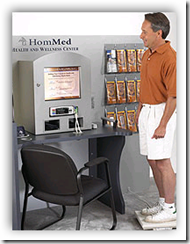Good concept and probably a very useful product....I post many new technology items on the blog, but when it comes right down to use, for patients and physicians, how connected do we want to be? Where's the balance between when a device or system becomes intrusive instead or useful? I don't think it's a matter of how much information we can produce, those days are here right now, but how much do we want and how much WILL we use...and where will technology be used...and by who, and last but not least, who's going to pay for all of it? I have to ask myself would I want to go through the motions of working with this device every day...probably not unless my life depended on it, or my insurance claim payments forced me to work with something like this, but just my overall choice for myself...NO...a bit more than I may want to know right now...I could be so wrapped up in taking care of myself that my focus on just plain and simple living and enjoyment would diminish...not to take away from the products listed here at all as there are tons more out there as well, just how many products can and will we decide to use before life as we know it vanishes right in front of our eyes..and the choice to occasionally disconnect is gone...BD
Honeywell has won the 2008 Medical Design Excellence Awards (MDEA) for its Genesis DM remote patient care device. The Genesis DM won in the rehabilitation and assistive-technology products category.
Honeywell said that its HomMed remote patient monitoring device is ideal for both the patient and the medical professional, using text or voice prompts to guide patients through a series of yes/no questions that allow medical professionals to monitor and receive a thorough health assessment.
A patient using Honeywell HomMed’s Sentry Telehealth Monitor can quickly collect and securely transmit data on five key vital signs: heart rate, blood pressure, oxygen saturation, temperature, and weight. The FDA Class II (hospital grade) device uses text or voice prompts to guide patients through a series of yes/no questions that allow the medical professionals monitoring them to receive a thorough health assessment.
There are also new products like this one in a public area...the health kiosk...BD
Using the Health Center Kiosk is easy, and the entire process can be carried out quickly and securely. Each user is issued a personalized card (similar to an ATM card) that they swipe into the kiosk to begin the program. Next, a friendly voice and easy-to-read display guide the user through the process of collecting his or her vital signs – from weight and blood pressure to heart rate and oxygen saturation. The kiosk can even ask a series of yes/no questions to assess general health issues.




0 comments :
Post a Comment